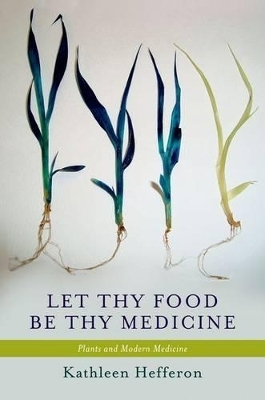
Let Thy Food Be Thy Medicine
Oxford University Press Inc (Verlag)
978-0-19-987397-5 (ISBN)
Are herbal medicines effective? Are organic foods really better for you? Will the cure to cancer eventually come from a newly discovered plant which dwells in the Amazon basin? Will medicines ever become affordable and available to the neediest? How will we produce enough food to keep up with an ever-increasing world population? Written with these issues in mind, Let Thy Food Be Thy Medicine is a response to the current flood of conflicting information regarding the use of plants for both consumption and medicinal purposes. Kathleen Hefferon addresses the myths and popular beliefs surrounding the application of plants in human health, revealing both their truths and inaccuracies, and provides an overview of the technologies scientists are using to further their research.
The book covers herbal medicines, functional and biofortified foods, plants and antibiotics, edible vaccines, and organic versus genetically modified foods, discussing each from a scientific standpoint. It these topics together for the first time, providing a much-needed overview of plants as medicine. Intended for scientists and professionals in related disciplines as well as the interested reader educated in the sciences, this book will confront claims made in the media with science and scientific analysis, providing readers with enough background to allow them to make their own judgments.
Kathleen Hefferon received her PhD in the Faculty of Medicine at the University of Toronto. She most recently held the title of Director of Operations, Human Metabolic Research Unit in the Division of Nutritional Sciences at Cornell University. She is a science writer for the Center for Hepatitis C Research at Rockefeller University.
Chapter 1. Plants and Human Health ; Our Early Relationship with Plants ; Plants as Medicine ; Chapter 2. Bioprospecting For Medicines form Plants ; Ethnobotany and Medicine ; Modern drug discovery and indigenous cultures ; Plants and Drug discovery ; Examples of Medicines derived from plants ; Impact of Biopiracy, Preservation of Biodiversity ; Intellectual Property Rights for Indigenous People ; Chapter 3. The Lure of Herbal Medicine ; History ; The bioactive compounds in herbal medicinal plants ; Examples of Herbal Medicines ; Traditional Indian Medicine ; Traditional Chinese Medicine ; What nonscientists should know about Herbal Medicines ; What scientists need to know about herbal medicines ; Could herbal medicine and Western medicine complement each other? ; Chapter 4. Farming Medicines from Plants ; Why farm for pharmaceuticals from plants? ; New production systems ; How does it work? ; Technologies used to design plants expressing biopharmaceuticals ; Clinical trials of therapeutic proteins produced in plants ; Allergies, oral tolerance, and dose response relationships to plant-made vaccines ; Scale-up and commercialization opportunities for plant-derived therapeutic proteins ; Plant production platforms for molecular farming ; Molecular farming requires its own unique set of regulatory guidelines ; Chapter 5. Superfood: Functional and Biofortified Food ; The science behind functional foods ; Functional foods and human genetics ; The Mediterranean Diet: The ideal diet? ; Do dietary supplements work? ; Functional foods as superfoods ; Biofortified foods and hidden hunger ; Can biofortified foods make a difference? ; Chapter 6. Food Security, Climate Change, and the Future of Farming ; Norman Borlaug and the Green Revolution ; The Green Revolution missed Africa ; Agricultural makeover: sustainable intensification ; Up and Coming technologies; crop improvement ; Improved farming techniques ; Environmental uses for plants ; Agricultural sustainability and organic food ; Chapter 7. The Importance of Biodiversity ; Foods as drugs ; What will the food industry look like? ; An urban answer to increased food production: vertical farms ; Agricultural sustainability and protection of biodiversity: a daunting challenge ; Biodiversity and the search for new medicines ; The importance of public perception in shaping our future ; Regulating agricultural innovations can be a double-edged sword
| Erscheint lt. Verlag | 25.10.2012 |
|---|---|
| Zusatzinfo | 61 b&w |
| Verlagsort | New York |
| Sprache | englisch |
| Maße | 239 x 165 mm |
| Gewicht | 408 g |
| Themenwelt | Sachbuch/Ratgeber ► Gesundheit / Leben / Psychologie |
| Medizin / Pharmazie ► Gesundheitsfachberufe ► Diätassistenz / Ernährungsberatung | |
| Medizin / Pharmazie ► Medizinische Fachgebiete ► Pharmakologie / Pharmakotherapie | |
| Medizin / Pharmazie ► Naturheilkunde ► Phytotherapie | |
| Studium ► Querschnittsbereiche ► Prävention / Gesundheitsförderung | |
| Naturwissenschaften ► Biologie ► Botanik | |
| Naturwissenschaften ► Biologie ► Ökologie / Naturschutz | |
| ISBN-10 | 0-19-987397-6 / 0199873976 |
| ISBN-13 | 978-0-19-987397-5 / 9780199873975 |
| Zustand | Neuware |
| Haben Sie eine Frage zum Produkt? |
aus dem Bereich


